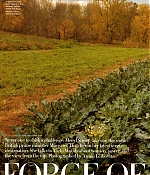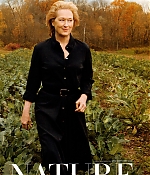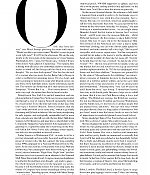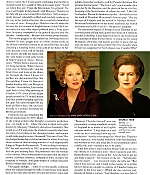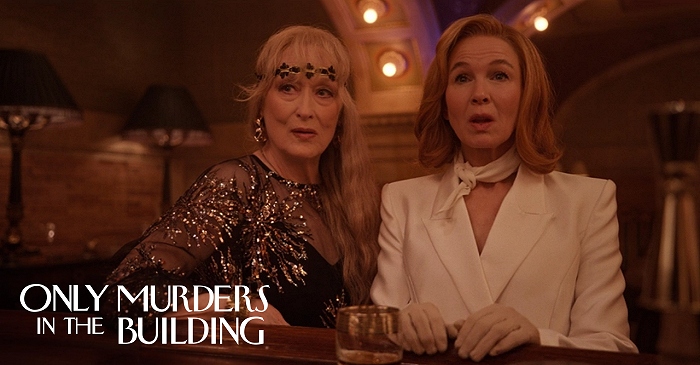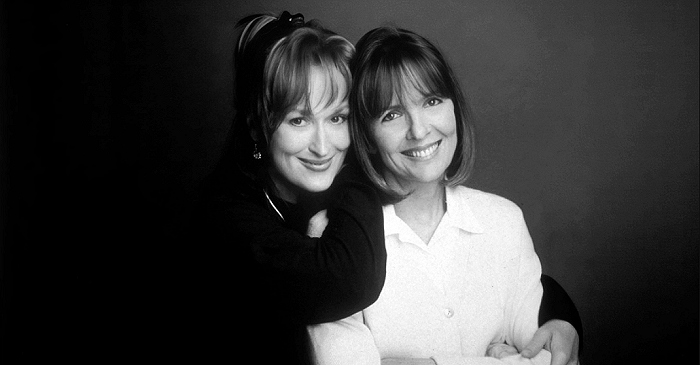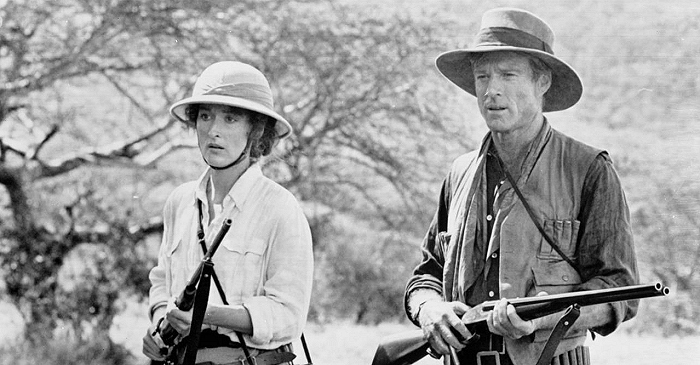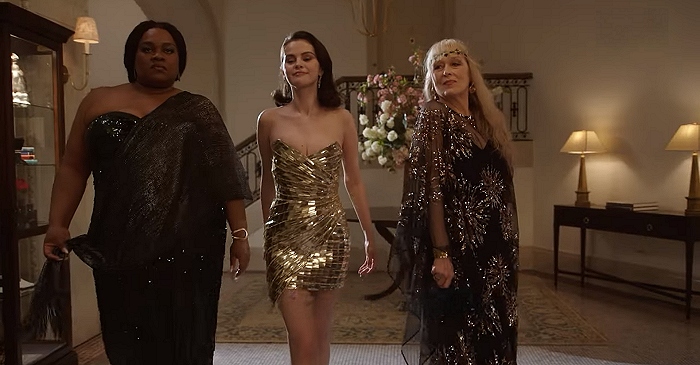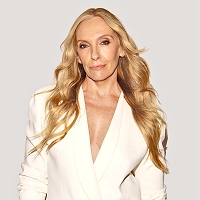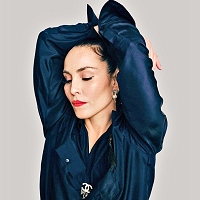|
Simply Streep is your premiere online resource on Meryl Streep's work on film, television and in the theatre - a career that has won her acclaim to be one of the world's greatest living actresses. Created in 1999, Simply Streep has built an extensive collection over the past 25 years to discover Miss Streep's body of work through thousands of photographs, articles and video clips. Enjoy your stay and check back soon.
|
|
Force of Nature
Vogue (US) ·
January 2012
· Written by Vicki Woods
| ||
|
Tags
|
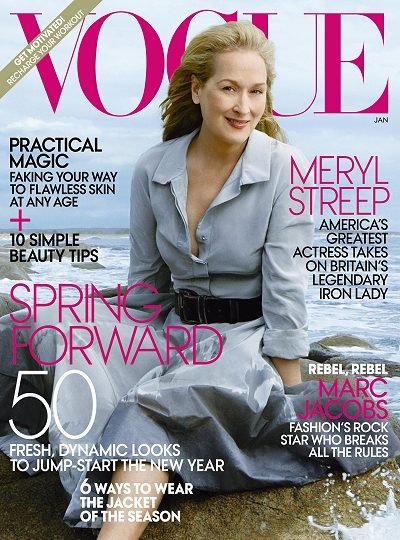
“Oooh, they have oysters,” says Meryl Streep, perusing the menu with intent. “Would you like to get some oysters? Wouldn’t oysters be great to eat right now?” It’s 4:20 in the afternoon. We are the only people in the restaurant on the mezzanine at Union Station, Washington, D.C. I pass, but Streep says, “I think I’ll have some oysters. And a glass of Chardonnay.” The waitress, who is fizzing with efficiency and controlled celebrity-awareness, makes to whisk off, but Streep calls her back on a sudden thought: “Do you have fresh oysters?” Her face has the look of a woman who has spent the day Being Meryl Streep in order to publicize her upcoming movie, The Iron Lady, and now is yearning to slurp down oyster after leisurely oyster, raw and briny on the half-shell, mmm, maybe with lemon, maybe not. The waitress says firmly that all of their oysters are fresh. Streep says, “I know. But. Um. . . . Don’t worry about it.” And with a tiny sigh, she awaits them fried in bread crumbs.
Streep lives in New York City and in Connecticut, and was photographed in Upstate New York striding through a crop of organic broccoli sustainably farmed by a local farmer. I love the little half-smile on her face. (She told Vogue’s Fashion Director, Tonne Goodman, that she “can’t smile and think at the same time,” which is [a] totally charming and [b] hard to believe.) She has been proselytizing for safe, organic, and ecologically sustainable food for more than a decade now (she fell out with the late Julia Child about wanton overfertilization), and since she is a shareholder in the Community-Supported Agriculture (CSA) organization, I’m guessing it’s a supportive smile she is bestowing on the broccoli field at Sol Flower Farm; kale, cabbages, winter squash, and leeks are also available in broccoli season.
Today Streep is in Washington, D.C., in order to sit for a portrait alongside an honorable, honored, and bipartisan group of women who, like her, support the long-standing (since 1998) campaign for a National Women’s History Museum. So far, this exists as a virtual entity with a nice Web site (nwhm.org), but campaigners have been working to get an actual, physical museum “Right Here. Right Now” (as their literature puts it) on a property on or adjacent to the National Mall. Since this is federal land, Congress must pass legislation to authorize the purchase, even though—get ready to gasp—the whole museum will not cost the taxpayer one penny, because it will be privately funded. For some long years, the wheels of Congress have turned exceedingly slowly on this “women’s issue.” Speeding up now, though with Meryl Streep as the NWHM National Spokesperson. At last year’s fund-raising gala, she donated one million dollars and considerable oratorical punch. NWHM supporters are upbeat, and there she is in the picture, smiling another little half-smile, on the West Lawn. You’d like to have this woman on your side. In the current financial climate, the ambition to help build a museum from scratch in order to fix the female place in American history may seem less than pressing. Not to Streep. She says it’s extremely important symbolically to tell the story that hasn’t been told “because our history was written by the other team, basically. For instance,” she says, forking at a bread-crumbed oyster, “we are taught about Benedict Arnold, the first traitor in America, but I’ve never heard—until I went onto the museum Web site—about Deborah Sampson, the first woman to take a bullet for her nation. She was 21 years old in the Revolutionary War. She enlisted on the American side under a man’s name, wore boys’ clothing, was cut with a British saber across her forehead, and took a musket ball in her thigh.” She’s a good storyteller, with a warm, urgent voice. “And her compatriots carried her six miles to the doctor’s, and he stitched up her head and she wouldn’t let him take her pants off—because he would discover she was a woman!” So did she die of her wound? “No—she was very good with her needle, so she cut the musket ball out and sewed her own leg up and served another eighteen months. In 1783 she was discharged, went home and had three children.” Sampson was granted £34 by the state of Massachusetts for exhibiting “an extraordinary instance of feminine heroism by discharging the duties of a faithful, gallant soldier, and at the same time preserving the virtue and chastity of her sex unsuspected and unblemished.” Amazing story. “And I am 60 years old and I learn this story,” says Streep. “I should have learned that story in the fourth grade. Because it helps you as a child to know that it is not just Paul Revere riding a horse and calling, ‘The British are coming, the British are coming.’ It’s not just Benjamin Franklin and George Washington and the battles won, it’s the bravery of all these people that are undiscovered, unknown.” She says that since women are great diarists, there is a huge cache of information that just hasn’t made it into the history books or into the halls of importance (a wonderful phrase I never heard before).
Streep should get Tales of Our Foremothers on tape forthwith. She is a force of nature. She could persuade boys. She has swapped the stately Carolina Herrera coatdress in which she was gliding around the Capitol earlier today for workaday jeans and a print top to ride the train back to New York’s Penn Station. Her skin is fabulous and luminously pale, and her pretty hands are manicured so naturally that I can’t tell if her nails are polished or just beautifully buffed. She is slight and delicate, maybe more than I expected—but that’s because my recollection of her physicality is not memory (I never met her before) but illusion. Streep on my screen is sturdy, giant, and galumphing; homely, fine-boned, and aristocratic; earthy and sensual; couture-skinny; heart-of-glass delicate: It is not just her accents that change from movie to movie. At her best, it’s her essence. In The Iron Lady, she all but becomes a woman of history, who seized the leadership of her party, and her country, and bestrode the world.
Soho, London. Phyllida Lloyd, a slender figure in cargo shorts over gray leggings, a sailor-stripe T-shirt, and running shoes (“I try to run into work every day”), is an admired and in-demand director of British theater and opera. Mamma Mia!—which last time I looked totaled $609,841,210 at the box-office worldwide—was her debut feature film. A humongous start, no? In her poky little cutting room, she leaves me alone to watch the TV-size screen, explaining that the film is finished except for a couple of bits on the music track: “You’ll see where they are.” From the first minute, I’m gripped: The Iron Lady begins in the present, with Margaret Thatcher in her late old age (she turned 86 in October). Still as importantly dressed, splendidly coiffed, and carefully made-up as she was in her political heyday, she is painfully diminished by coups de vieux. Streep plays Thatcher from 49, when she became the first woman in English history to lead the Conservatives (or any other major political party). Four years later, her party triumphed at the general election and she became—unbelievably—Britain’s first woman prime minister. The nation goggled as she walked up Downing Street to Number 10, and I goggle now, in a Soho cutting room, as the blonde suburban woman in an unstylish blue suit and clutching a handbag looks at the card in her hand. In her odd, preachy voice, full of breath and pauses, she tells the nation that she “just wants to read some words of Saint Francis of Assisi.” She intones: “Where there is discord, may we bring harmony. Where there is error, may we bring truth,” and my brain fizzes and pops as she plows on through the lines. I know it’s artifice, not old newsreel clips that I’m watching. I know it’s America’s lauded leading lady, not Margaret Thatcher. Nevertheless, I am hurled right back to that May morning in London, 1979, when all the sleepy people around the TV in my kitchen had their mouths hanging open like koi carp. The same thought fills my head as filled it then. Oh, my God. It really is a woman. Heading the British government.
Feminism was just breaching the British mainstream by 1979. Many of the young women who thought a woman’s workplace was—or ought to be—where the men worked were quite thrown by Margaret Thatcher’s old-school femininity. She would go on TV and praise the prudent housewife who knew the price of everything in her shopping basket, and women would make gagging noises. Housewife? Get out of here! Her hard-edged leadership style had no time for whiny kvetching about sexism or time-wasting notions of such ungraspable things as Wages for Housework. “I owe nothing to women’s lib,” she said succinctly in 1982, as prime minister. Indeed. And she gave nothing back. She promoted only one woman to her cabinet. Most commentators accepted that she didn’t admire, celebrate, embrace, sympathize with, or enjoy the company of women. And great swaths of college-educated British women didn’t like her. Then again, though . . . some of us were equally conflicted when she walked through the halls of importance and talked back at the men who ran the USA and the Soviet Union and Europe. She became quite beautifully dressed in her second term, wearing demi-couture suits that Aquascutum made her, and appearing as Gloriana Imperatrix in high-collared velvet evening frocks or—once—an actual ruff. Her hairdressing became pretty spectacular also; she adopted the golden crown that worked so well for Pamela Harriman. Her pictures became sexier: “The Iron Lady” was a moniker first given her by the Russians, and the photo of her in a fur hat, beaming at the Soviet leader, of whom she said, “I like Mr. Gorbachev. We can do business together,” absolutely proves the truth of President Mitterrand’s famous quip: “She has the eyes of Caligula and the mouth of Marilyn Monroe.” Mitterrand’s admiration for her wasn’t unalloyed; her French nickname was la fille d’épicier—the grocer’s daughter. The emotional impact of Streep as fiery Thatcher in her crowned prime yelling back across the House of Commons benches is thrilling. Lloyd hadn’t known if she would need two actresses or three for her movie. A young one for young Margaret, obviously, but maybe another in great old age and one more for her fierce prime? Her first thought when Streep was suggested for both phases was Crumbs! Why? “Because Thatcher herself was one provocation; casting somebody outside of England in so much of an English role was another.” Lloyd slept on it and woke up next morning knowing the production “needed everything that Meryl has. Thatcher was a superstar. You needed somebody with that charisma, and warmth as well, and inner life. It was potentially rather a chilly role, and I wanted it not to be chilly.”
In the first week, Lloyd watched Streep walk on-set into the House of Commons with “three hundred and fifty [male] British actors staring at her. And she had to get up and make a speech.” The tension on the set—“between her and the chaps”—was extremely high, she tells me. “But what I find moving, and I think is the essence of it, is that Meryl’s being an outsider is a mirror of Thatcher being an outsider in the Tory party.” Which she was, and not only because of being a woman. “And therefore you have Meryl coming in and having to work harder than one of our great English actresses would have had to work. Having to do more preparation, stay up later, just work, work, work to be able to stay up there on the tightrope.” She points out that Streep, working in another accent, is having to mint every piece of language—in a way that almost mirrors what Margaret Thatcher, at the beginning, had to do. She had already thrown off her provincial Lincolnshire accent. Then—in the House of Commons—she had to learn to speak powerfully, lower her voice. Lloyd is sure she had to be careful always, “once she had been through her Gordon Reece phase”—Reece was the television producer who became Thatcher’s image-maker and consigliere—“that she didn’t suddenly become shrieky, slip off the tightrope, and be exposed.” She was exposed once. I was listening to Prime Minister’s Question Time on the radio in my kitchen and heard her shouting that “the honorable gentleman is afraid, frightened, frit.” Frit? I’m from the north of England—I knew from frit. But the louche metropolitan newsmen in the parliamentary lobby went to town on the so-amusing dialectical variant. Streep knew “the outlines” of the rage that people had about Thatcher. “In this country, it was blended with anti-Reaganism,” she says, “but there was a special venom reserved for her, I felt, because she was a woman.” Streep very much felt a defensive instinct about her. “With any character I play, where she is me is where I meet her. It’s very easy to set people at arm’s length and judge them. Yes, you can judge the policies and the actions and the shortcomings—but to live inside that body is another thing entirely. And it’s humbling on a certain level and infuriating, just like it is to live in your own body. Because you recognize your own failings, and I have no doubt that she recognized hers.” Me: Oh, I don’t know that she recognized any failings. Streep: “Acknowledged them.” Me: Ha! Maybe she thought she’d been too weak occasionally. Streep tilts her head and says evenly that Margaret Thatcher was remarkably nonjudgmental. “If you think of a conservative in the United States, we think of a sort of moral Puritan or something. She didn’t have any of those things.” She shrugs. “I don’t know about not promoting women. Here’s what really surprised me: From the moment the day started until it was three, four in the morning, she just never, ever stopped, and she worked so hard and relentlessly to be able to be in that position where what she said was the course the nation took. It was really extraordinary, her tirelessness, sheer stamina. When I say that, I really mean it, because I work hard, I know what working hard is and I know what staying up late is, and you can do it for a certain time. But to do it for eleven years? And out of power, to keep on with it, into the sunset? Superhuman.”
I tell her that Phyllida Lloyd had said of her: “She’s always the last to drop.” Streep says, “Takes one to know one!” The Iron Lady is one of the roles of Meryl Streep’s career, I think. We maybe won’t rehearse the puzzle of how many times she has to be nominated before she gets another Best Actress Academy Award, but she is brilliant as Thatcher, whose extraordinary strength and self-belief and forceful ability to capture all the power in a room and dominate it flood out of the screen. “It’s not an impersonation on any level,” says Lloyd. “It’s an incarnation. Of a very particular kind.” Streep has not cared about anything she has done in a long time as much as this, she says. “Because the material embedded in it is a lot of what I’ve been thinking about. The themes in the film, which I don’t feel like underlining, have interested me for a while. And you never see these subjects covered in films normally, and so that was very thrilling.” What subjects? I ask, picking up my underlining pen—women? Power? “Women and power and diminishment of power and loss of power,” she says. “And reconciliation with your life when you come to a point when you’ve lived most of it and it’s behind you. I have always liked and been intrigued by older people, and the idea that behind them lives every human trauma, drama, glory, jokes, love.” She was close to her grandmother, and remembers her saying that her husband, Streep’s grandfather, would be out playing golf when the school-board elections would come up. “My grandmother didn’t give a damn about politics, but she really cared who was going to be on the school board, and she would go out, interrupt him on the eighth hole, and give him a piece of paper with the names of the candidates on it and tell him who to vote for—but she was not allowed to vote. She was not allowed to vote for dogcatcher in her town, never mind president. Never mind imagine being president.”
She has played so many roles in the 35 years of her movie career. She never was an ingenue; when her first film came out, in 1977 (Julia, with Jane Fonda and Vanessa Redgrave), she was 28. In the eighties, the era of Reaganomics and Thatcherism, she made huge movies in a Babel of accents and dialects: The French Lieutenant’s Woman, Sophie’s Choice, Silkwood, Out of Africa, A Cry in the Dark. In 1989, she turned 40. “I remember turning to my husband and saying, ‘Well, what should we do? Because it’s over.’ ” The following year, she received three offers to play witches in different movies. She saw the subtext pretty clearly: “Once women passed childbearing age they could only be seen as grotesque on some level.” But with The Bridges of Madison County (1995) she captured “the audience that were my girls, that I knew they’d get it if we could get the movie made,” hence Dancing at Lughnasa and One True Thing, which were also about “women whose usefulness had passed.” And her last five years saw hit follow hit: The Devil Wears Prada, Mamma Mia!, Julie & Julia, It’s Complicated. That last film, she says, “in the period of Silkwood, could never have been made, with a 60-year-old actress deciding between her ex-husband and another man. With a 40-year-old actress it would never have been made.” Now she’s 62, playing Margaret Thatcher—from 49 to 85—and the cover star of Vogue. She has such a big laugh bubbling under her serene expression that it finally bursts out as I duck around the o word: “I was joking with the ladies earlier,” she said (when they were having their picture taken). “And I told them I was probably the oldest person ever to be on the cover of Vogue.”
I said I thought she probably was, but I’d hand it to the fact checkers. And raised her a glass. She’s America’s sweetheart, this woman. And if she was British, they’d have made her a dame long ago.


Posted on October 14th, 2025
|
Posted on October 11th, 2025
|
Posted on September 30th, 2025
|
Posted on September 16th, 2025
|
Posted on September 9th, 2025
|




